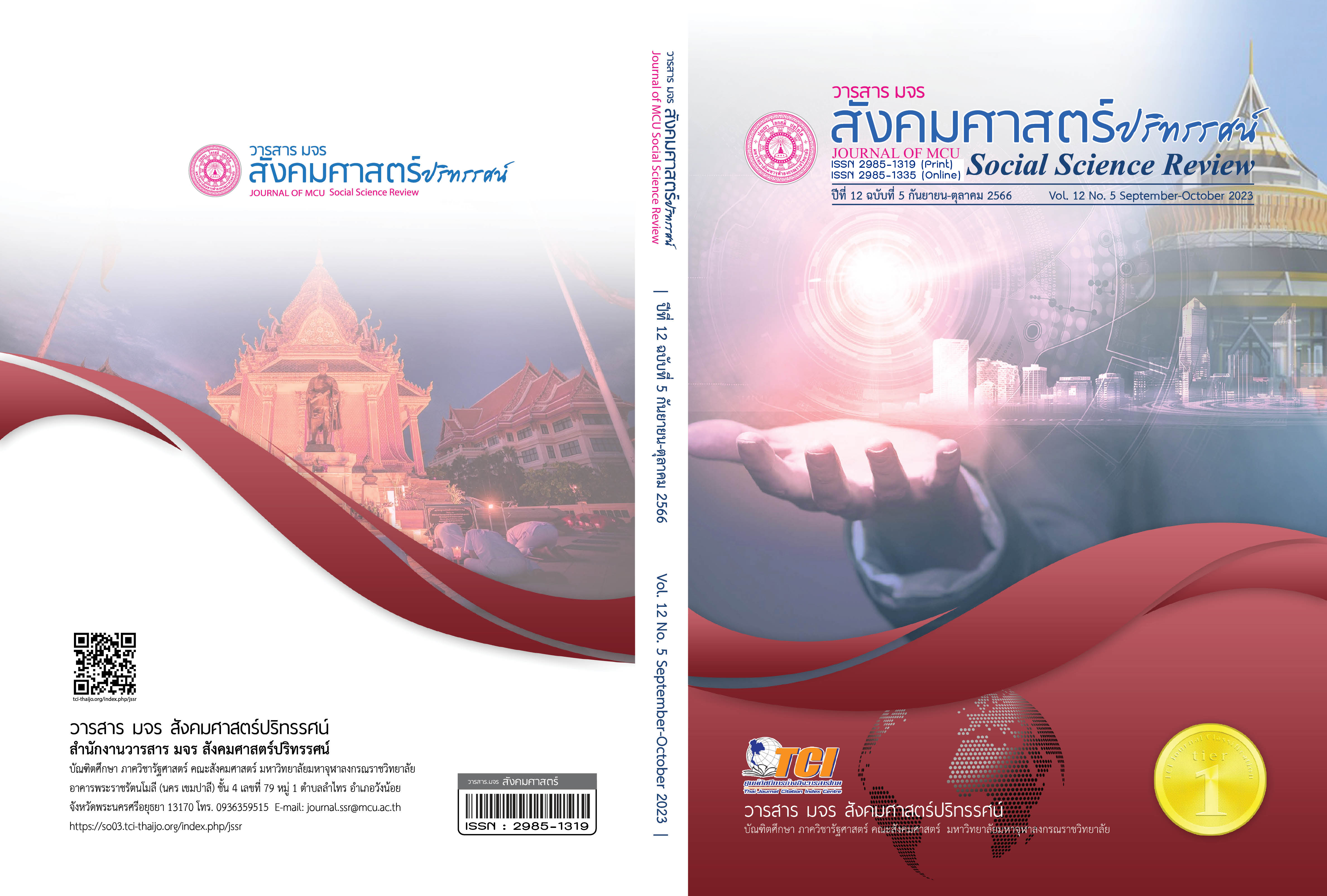ประโยชน์ของปัญญาประดิษฐ์ในการจัดการกิจการสาธารณะของประเทศไทย
คำสำคัญ:
ปัญญาประดิษฐ์, การจัดการกิจการสาธารณะ, ประเทศไทยบทคัดย่อ
บทความวิชาการนี้มีวัตถุประสงค์เพื่อตรวจสอบปัญญาประดิษฐ์มีบทบาทต่อการจัดการกิจการสาธารณะของประเทศไทย การศึกษาพบว่าประเทศไทยได้นำปัญญาประดิษฐ์มาใช้ในหน่วยงานราชการอยู่บ้าง แต่ยังเป็นเพียงระยะเริ่มต้น หลายประเทศนำปัญญาประดิษฐ์ทำหน้าที่แทนมนุษย์ในกิจการงานต่าง ๆ ได้เสมือนมนุษย์จริง ซึ่งจะก่อให้เกิดประโยชน์ในการดำเนินงานของกิจการบริหารประเทศทั้งแง่ของความรวดเร็ว ความเป็นอัตโนมัติ ความสะดวกในการเข้าถึงข้อมูล ความถูกต้องแม่นยำของสารสนเทศเพื่อประกอบการตัดสินใจของผู้บริหารประเทศ ไม่ว่าจะเป็นกิจการทางธุรกิจ อุตสาหกรรม การจัดการ การผลิต การทหาร ฯลฯ รวมทั้งนำปัญญาประดิษฐ์มาใช้ในการปรับปรุงกิจการสาธารณะให้ทันสมัย สร้างความสะดวกรวดเร็ว แก้ไขปัญหาสาธารณะที่ข้อมูลซับซ้อนขนาดใหญ่ ประชาชนสามารถเข้าถึงข้อมูลข่าวสารของทางราชการได้มากขึ้น หน่วยงานรัฐสามารถให้บริการได้โดยไม่จำกัดเวลาและสถานที่ ในขณะเดียวกันยังรับประกันความโปร่งใส ลดการทุจริต สร้างความถูกต้องและความปลอดภัยของข้อมูลที่ประมวลผล และยังเป็นการสร้างโอกาสเพิ่มพื้นที่การเติบโตใหม่ทางเศรษฐกิจโดยเฉพาะภาคเศรษฐกิจดิจิทัล ดังนั้นรัฐบาลไทยควรมีหน่วยงานที่ความคล่องตัวในการจัดการเพื่อสร้างพัฒนาและพัฒนาปัญญาประดิษฐ์เพื่อนำมาใช้ในกิจกรรมสาธารณะที่หลากหลาย เพื่อเพิ่มผลิตภาพของประเทศ และประสิทธิภาพในกระบวนการบริหารกิจการสาธารณะ อันจะส่งผลสร้างความมั่งคั่งให้มีผลิตภัณฑ์มวลรวมประชาชาติของประเทศเพิ่มขึ้นต่อเนื่องอย่างมีเสถียรภาพ
เอกสารอ้างอิง
ปณชัย อารีเพิ่มพร. (2019). Google เปิดผลประกอบการ YouTube ครั้งแรก รายได้โต 35% ทะลุ 4.6 แสนล้านบาท. สืบค้น 23 มีนาคม 2565, จาก thestandard.co/google
วิชัย เทียนถาวร. (2561). การปกครองราชอาณาจักรไทย สมัยกรุงรัตนโกสินทร์ยุคกลาง : ในรัชกาลที่ 5 (พ.ศ.2411-2453). สืบค้น 23 มีนาคม 2565, จาก www.matichon. co.th/article/news_1000127
ลุงแมน. (2022). Microsoft เน้นขายซอฟต์แวร์ แต่มีรายได้ 7,000,000 ล้านบาท. สืบค้น 23 มีนาคม 2565, จาก https://www.longtunman.com/43243
สำนักงานพัฒนาธุรกรรมทางอิเลคทรอนิกส์. (2564). ปัญญาประดิษฐ์ในการให้บริการของภาครัฐ. สืบค้น 23 มีนาคม 2565, จาก https://www.etda.or.th/th/Useful-Resource/ Knowledge-Sharing/Articles/AI-in-Government-Services.aspx
Bini, S. (2018). Artificial intelligence, machine learning, deep learning, and cognitive computing: What do these terms mean and how will they impact health care. The Journal of Arthroplasty, 33(8), 2353-2361.
Business & Technology. (2021). เทคโนโลยี AI คืออะไร? รู้จักกับ 3 ประเภทของ AI ที่เพิ่มขีดความสามารถให้กับธุรกิจ. สืบค้น 23 มีนาคม 2565, จาก aigencorp.com/3types-of-ai-for-business
Boyd, M. & Wilson, N. (2017). Rapid developments in artificial intelligence: How might the New Zealand government respond. Policy Quarterly, 13(4), 36-44.
Britannica. (2023). Alan Turing and the beginning of AI. Retrieved March 20, 2020, from https:// www.britannica.com/technology/artificial-intelligence/Alan-Turing-andthe-beginning-of-AI
Callender, C. (2001). Public Sector Organizations. International Encyclopedia of the Social & Behavioral Sciences, 2(11), 695-702.
Kutergina, E. (2017). Computer-based simulation games in public administration education. NISPAcee Journal of Public Administration and Policy, 10(2), 119-133.
Lane, J. (2002). New public management: An introduction. London: Routledge.
Russell, S. & Norvig, P.1995). Artificial intelligence: A modern approach. Englewood Cliffs, NJ: Prentice-Hall.
Schacter, D. L. (1987). implicit memory: History and current status. Journal of Experimental Psychology: Learning, memory and cognition, 13, 501-518.
Silver, D., et al. (2017). Mastering the game of Go without human knowledge. Nature, 550(7676), 354-359.
Stajic, J., et al. (2015). Rise of the machines. Science, 349(6245), 248-249.
Schacter, D. L. (1987). implicit memory: History and current status. Journal of Experimental Psychology: Learning, memory and cognition, 13, 501-518.
Smart Nation Singapore. (2023). The Next Frontier of Singapore’s Smart Nation Journey. Retrieved March 20, 2020, from https://www.smartnation.gov. sg/initiatives/artificial-intelligenc
Wirtz, B., et al. (2018). Artificial intelligence and the public sector–Applications and challenges. International Journal of Public Administration, 42(7), 1-20.
World Economic Forum. (2021). 9 ethical AI principles for organizations to follow. Retrieved March 20, 2020, from https://www.weforum.org/agenda/2021/ 06/ ethical-principles-for-ai/
ดาวน์โหลด
เผยแพร่แล้ว
รูปแบบการอ้างอิง
ฉบับ
ประเภทบทความ
สัญญาอนุญาต
ลิขสิทธิ์ (c) 2023 วารสาร มจร สังคมศาสตร์ปริทรรศน์

อนุญาตภายใต้เงื่อนไข Creative Commons Attribution-NonCommercial-NoDerivatives 4.0 International License.
เพื่อให้เป็นไปตามกฎหมายลิขสิทธิ์ ผู้นิพนธ์ทุกท่านต้องลงลายมือชื่อในแบบฟอร์มใบมอบลิขสิทธิ์บทความให้แก่วารสารฯ พร้อมกับบทความต้นฉบับที่ได้แก้ไขครั้งสุดท้าย นอกจากนี้ ผู้นิพนธ์ทุกท่านต้องยืนยันว่าบทความต้นฉบับที่ส่งมาตีพิมพ์นั้น ได้ส่งมาตีพิมพ์เฉพาะในวารสาร มจร สังคมศาสตร์ปริทรรศน์ เพียงแห่งเดียวเท่านั้น หากมีการใช้ภาพหรือตารางหรือเนื้อหาอื่นๆ ของผู้นิพนธ์อื่นที่ปรากฏในสิ่งตีพิมพ์อื่นมาแล้ว ผู้นิพนธ์ต้องขออนุญาตเจ้าของลิขสิทธิ์ก่อน พร้อมทั้งแสดงหนังสือที่ได้รับการยินยอมต่อบรรณาธิการ ก่อนที่บทความจะได้รับการตีพิมพ์ หากไม่เป็นไปตามข้อกำหนดเบื้องต้น ทางวารสารจะถอดบทความของท่านออกโดยไม่มีข้อยกเว้นใดๆ ทั้งสิ้น





